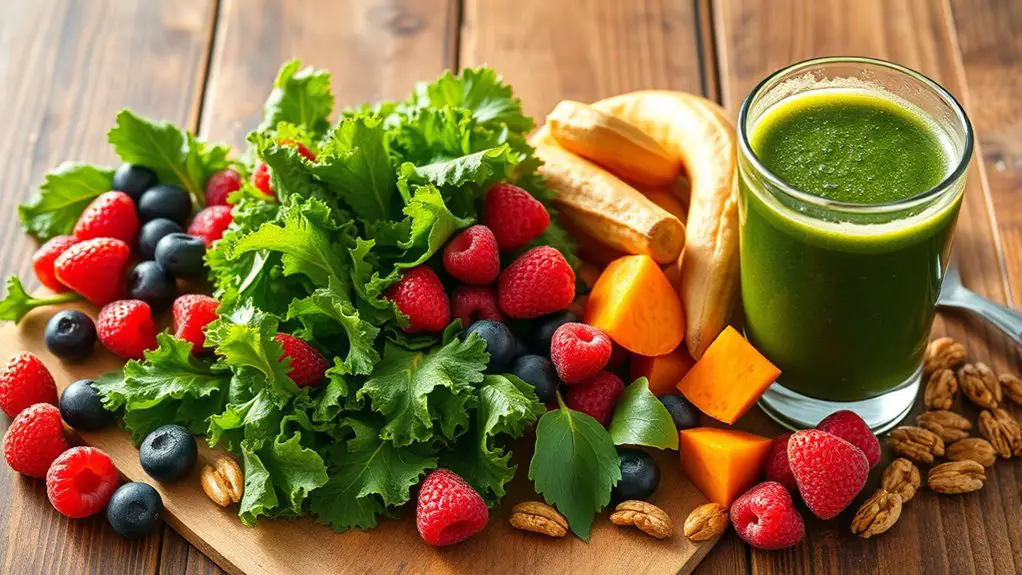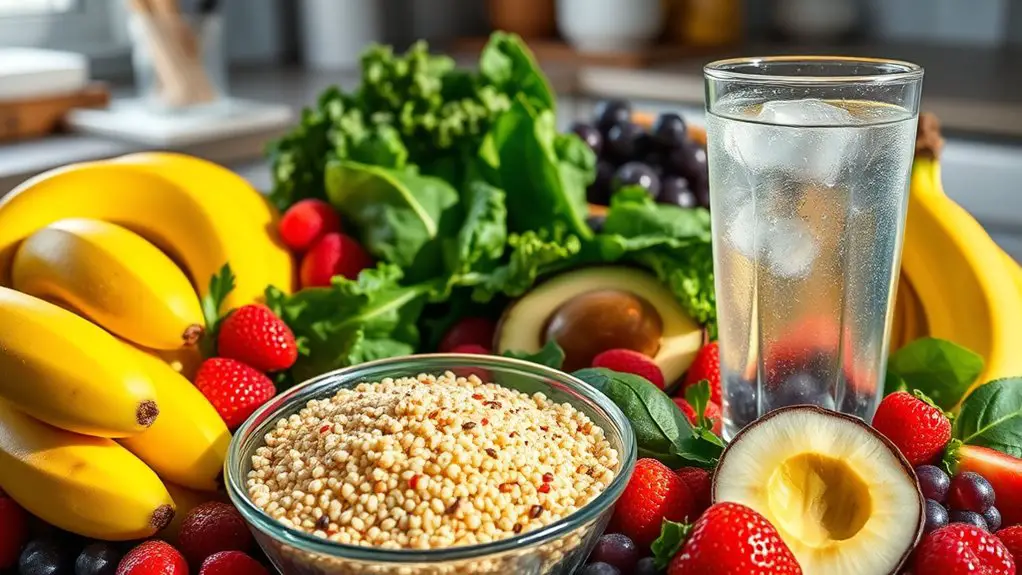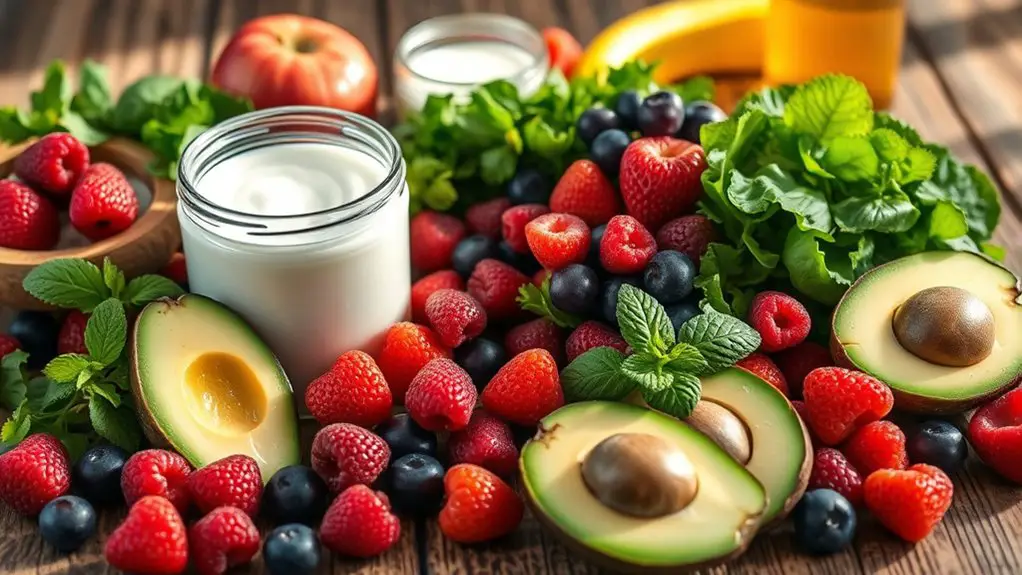Whole foods beat supplements for athletic recovery because they provide a complex blend of nutrients that work together to enhance healing. They're rich in antioxidants, fiber, and hydration, all of which help reduce inflammation and support digestive health. Whole foods also improve mood and provide sustained energy through balanced macronutrients, which can help with recovery. Plus, they offer long-term health benefits that isolated supplements can't match. You'll discover even more reasons to choose whole foods over supplements.
The Nutrient Density of Whole Foods
When you're fueling your body for athletic recovery, the nutrient density of whole foods can't be overlooked. Whole foods are packed with vitamins, minerals, and essential nutrients that support your body's healing processes. Unlike processed options, these natural foods offer a harmonious balance of carbohydrates, proteins, and healthy fats, allowing you to bounce back faster and feel more energized.
Imagine enjoying a colorful plate filled with fruits, vegetables, whole grains, and lean proteins. Each bite nourishes you, offering the freedom to recover without the uncertainty that comes with supplements. By prioritizing whole foods, you're also embracing a lifestyle that values quality and sustainability. Consuming adequate protein intake not only aids in muscle repair but also enhances strength and performance in your future workouts.
You deserve to feel your best, and choosing nutrient-dense options not only fuels your recovery but also empowers you to take control of your health. So go ahead, savor those whole foods, and let your body thrive as you embrace your athletic journey.
The Role of Antioxidants in Recovery
Nutrient-dense whole foods not only provide the building blocks your body needs for recovery but also supply a rich source of antioxidants. These powerful compounds combat oxidative stress from intense workouts, helping to reduce inflammation and promote faster recovery. By choosing whole foods, you can enhance your performance and feel more energized. Incorporating a variety of fruits, vegetables, and whole grains is essential for optimal gut health, which supports your overall recovery process.
Consider adding these antioxidant-rich foods to your diet:
- Berries: Blueberries, strawberries, and raspberries are packed with vitamins and flavonoids.
- Leafy Greens: Spinach and kale are not just nutritious; they're loaded with antioxidants like vitamins C and E.
- Nuts and Seeds: Walnuts and flaxseeds provide healthy fats and a boost of antioxidants.
Incorporating these foods into your meals can empower your recovery process. You'll not only feel better but also enjoy the freedom that comes from peak health and performance.
How Whole Foods Promote Better Hydration
When it comes to staying hydrated, whole foods can be your best ally. Foods like fruits and vegetables not only provide water content but also help maintain your electrolyte balance. By incorporating these natural sources into your diet, you can enhance your hydration and support your athletic recovery. Additionally, monitoring urine color can help you assess your hydration status and ensure you're adequately replenishing fluids.
Hydration From Natural Sources
Staying hydrated is essential for athletic performance, and whole foods can be your best allies in this effort. They not only provide hydration but also come packed with nutrients that enhance recovery. By incorporating water-rich foods into your diet, you can naturally boost your hydration levels without relying on supplements.
- Fruits: Watermelon, oranges, and strawberries are delicious ways to hydrate.
- Vegetables: Cucumbers, celery, and lettuce are crisp, invigorating, and full of water.
- Soups and broths: These warm options can be comforting and hydrating after intense workouts.
Electrolyte Balance in Foods
To maintain ideal hydration levels, it is crucial to balance electrolytes, and whole foods are an excellent source for this. Fresh fruits and vegetables, like bananas, oranges, and leafy greens, naturally contain key electrolytes such as potassium, sodium, and magnesium. Unlike supplements, these foods offer a variety of nutrients that work synergistically to enhance absorption and boost your overall health. When you reach for whole foods, you're not just hydrating; you're fueling your body with the right balance of essential minerals. This freedom to choose vibrant, nutrient-dense options allows you to recover effectively while enjoying delicious meals. So, ditch the synthetic powders and embrace the natural goodness of whole foods to keep your electrolyte levels in check and support your athletic performance.
The Impact of Fiber on Digestive Health
Although many athletes focus on protein and carbs for recovery, the role of fiber in digestive health shouldn't be overlooked. Fiber's essential for maintaining a healthy gut, which can directly impact your performance and recovery. When you consume whole foods rich in fiber, you're supporting not just digestion but also overall well-being.
- Promotes regular bowel movements: Keeps your digestive system running smoothly, preventing discomfort.
- Supports gut bacteria: A healthy microbiome can enhance nutrient absorption and immunity.
- Aids in satiety: Helps you feel full longer, reducing the urge to snack on less nutritious options.
Incorporating more fiber-rich foods like fruits, vegetables, and whole grains can make a big difference. You'll not only feel better but also recover more effectively from those intense workouts. Additionally, balancing macronutrients ensures that your body gets the full spectrum of nutrients necessary for optimal recovery. Embrace the freedom of feeling great both on and off the field!
Whole Foods vs. Isolated Nutrients
When it comes to recovery, you might wonder whether whole foods or isolated nutrients are better for your body. Whole foods offer nutrient synergy that can enhance digestion and overall performance, while isolated nutrients often miss out on these benefits. Let's explore how choosing whole foods might give you the edge you need for long-term gains. Additionally, incorporating whole foods rich in nutrients can optimize your body's response to workouts and improve recovery times.
Nutrient Synergy Benefits
While many athletes focus on isolated nutrients for recovery, the true power often lies in whole foods, where nutrient synergy plays an essential role. When you consume whole foods, you're not just getting individual vitamins and minerals; you're experiencing a harmonious blend that enhances absorption and effectiveness. This synergy means your body can utilize nutrients more efficiently, leading to better recovery.
- Whole foods contain complementary compounds that work together, like antioxidants and phytochemicals.
- Nutrient combinations in whole foods can amplify their benefits, making them more potent than isolated nutrients.
- Whole foods support a balanced dietary approach, promoting overall health and sustainability.
Embracing whole foods is more than a choice; it's a path to releasing your body's full recovery potential.
Digestive Health Considerations
Whole foods not only offer nutrient synergy but also play a significant role in digestive health. When you consume whole foods, you're getting a variety of fibers, enzymes, and probiotics that isolated nutrients in supplements simply can't match. These components work together to promote a healthy gut, helping you absorb nutrients more effectively and enhancing your recovery. Plus, whole foods encourage a diverse microbiome, which is essential for overall well-being. On the other hand, isolated nutrients can sometimes lead to digestive discomfort or imbalances. By focusing on whole foods, you're not just fueling your body; you're supporting your digestive system, allowing it to function at its best and giving you the freedom to thrive in your athletic pursuits.
Long-term Performance Gains
Although isolated nutrients can provide quick fixes for specific deficiencies, relying on whole foods for long-term athletic performance gains is far more advantageous. Whole foods offer a complex blend of vitamins, minerals, and antioxidants that work synergistically, fueling your body and enhancing recovery.
Consider the benefits of whole foods:
- Balanced Nutrition: They provide a range of nutrients, ensuring you're not missing anything essential.
- Sustained Energy: Whole foods deliver slow-releasing carbohydrates, keeping your energy levels stable during workouts.
- Improved Recovery: Antioxidants in whole foods help reduce inflammation, promoting faster muscle recovery.
The Synergy of Nutrients in Whole Foods
As you explore the world of athletic recovery, you'll discover that the nutrients in whole foods work together in ways that enhance their benefits. Whole foods provide a complex matrix of vitamins, minerals, and phytonutrients that synergize, creating a powerful impact on your body's healing and performance. For instance, pairing vitamin C-rich fruits with iron from leafy greens boosts iron absorption, helping to replenish your energy levels faster.
Additionally, whole grains and healthy fats contribute to sustained energy release, enabling your muscles to recover more effectively. This synergy means you're not just getting individual nutrients; you're tapping into a holistic approach that supports your entire system. Furthermore, understanding macronutrient roles is essential for optimizing your recovery and enhancing overall performance.
Reducing Inflammation Naturally
When it comes to athletic recovery, reducing inflammation naturally is crucial for optimizing your performance and healing. Instead of relying solely on supplements, you can incorporate whole foods that offer powerful anti-inflammatory properties. This approach not only nourishes your body but also empowers you to feel your best.
Reducing inflammation naturally through whole foods enhances athletic recovery and overall performance. Nourish your body and feel your best.
Consider these natural options:
- Berries: Packed with antioxidants, they combat oxidative stress and reduce inflammation.
- Leafy Greens: Vegetables like spinach and kale contain essential nutrients that promote healing and help lower inflammation.
- Fatty Fish: Rich in omega-3 fatty acids, fish like salmon can greatly decrease inflammation and improve recovery times. Additionally, incorporating complex carbohydrates into your diet supports glycogen storage, which is vital for optimal recovery and performance.
Supporting Mental Health and Mood
Athletic recovery isn't just about physical healing; mental health and mood play a significant role in your overall performance. Whole foods can be your allies in this journey, providing nutrients that support brain function and emotional well-being. Foods rich in omega-3 fatty acids, like salmon and walnuts, can help reduce anxiety and improve mood, while colorful fruits and vegetables pack antioxidants that combat stress.
When you nourish your body with whole foods, you're not only fueling your muscles but also uplifting your spirit. The vibrant flavors and textures of fresh ingredients can ignite joy in your meals, making healthy eating feel like a celebration rather than a chore. Additionally, incorporating healthy fats into your diet can enhance recovery and further support your mental health.
Plus, the act of cooking and sharing meals with friends or family can foster connections, enhancing your mental resilience. So, embrace whole foods not just for recovery but for a happier, more balanced you. Remember, your mind deserves just as much attention as your body.
Whole Foods and Long-Term Health Benefits
While you may focus on immediate recovery after workouts, incorporating whole foods into your diet can yield significant long-term health benefits. By prioritizing whole foods, you're not just fueling your body; you're laying the foundation for a vibrant, healthy life.
Consider these benefits:
- Improved Nutrient Absorption: Whole foods offer a spectrum of nutrients that work synergistically, enhancing your body's ability to absorb vitamins and minerals.
- Reduced Inflammation: Many whole foods contain antioxidants and anti-inflammatory compounds that can help minimize chronic inflammation, keeping you agile and pain-free.
- Enhanced Gut Health: A diet rich in whole foods promotes a diverse microbiome, supporting digestion and overall wellness.
- Balanced Electrolytes: Eating whole foods can help maintain proper electrolyte balance, which is crucial for effective muscle function and preventing cramps during exercise.
Embracing whole foods means you're choosing a path that empowers your body and mind, paving the way for both immediate recovery and lasting vibrancy. Your body will thank you for making this nourishing choice!
Practical Tips for Incorporating Whole Foods Into Recovery
How can you seamlessly integrate whole foods into your recovery routine? Start by planning your meals around nutrient-dense options. Think colorful fruits, leafy greens, and lean proteins. After your workout, whip up a smoothie with spinach, banana, and Greek yogurt for quick recovery. Don't forget to prep snacks—hummus with veggies or mixed nuts can keep you fueled between meals.
Experiment with whole grain options like quinoa or brown rice; they're perfect for replenishing energy levels. When you go grocery shopping, stick to the perimeter of the store where whole foods often reside.
Listen to your body and adjust your intake based on your activity level. Embrace variety; the more diverse your diet, the more nutrients you'll receive. Finally, make it enjoyable! Cooking with friends or exploring farmers' markets can turn recovery into a delightful experience, giving you the freedom to nourish yourself in a vibrant way.
Frequently Asked Questions
Can Whole Foods Improve Athletic Performance as Well as Recovery?
You're looking to enhance performance, and whole foods can fuel your workouts, boost energy, and aid recovery. By choosing natural sources, you're not just nourishing your body; you're empowering your athletic journey for ideal results.
Are There Specific Whole Foods Best for Post-Workout Recovery?
Yes, certain whole foods can enhance your post-workout recovery. Foods rich in protein, healthy fats, and carbohydrates—like chicken, quinoa, and sweet potatoes—help replenish energy, repair muscles, and reduce inflammation, supporting your overall fitness journey.
How Do Whole Foods Affect Muscle Soreness After Intense Exercise?
Whole foods foster faster healing, helping you handle muscle soreness after intense exercise. By nourishing your body with natural nutrients, you're empowering your recovery journey, enhancing energy levels, and embracing the freedom to perform at your best.
Can Supplements Be Beneficial in Certain Situations for Athletes?
Sure, supplements can be beneficial in certain situations, especially when whole foods aren't accessible. They might help you quickly meet nutritional needs, but relying solely on them could limit your overall health and performance.
How Do Budget Constraints Affect the Choice of Whole Foods?
Budget constraints influence your choice of whole foods by limiting options. You might prioritize affordable, nutrient-dense foods, but sometimes you'll have to compromise on variety or quality to stay within your financial limits.




